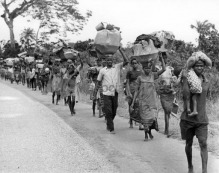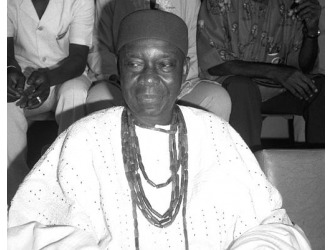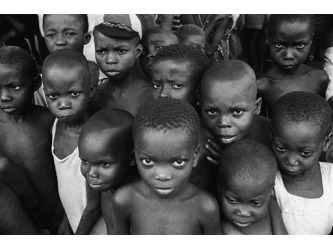Nigeria: Indigenous Ethnic Groups

by: Caitlin Golder
In 800 BC Nok people, believed to be the first organized African tribe, lived in central Nigeria. These were the first people identified as an indigenous ethnic group. (World Geography - Nigeria: History) While dates differ in research, around 100 AD, the southern region of Nigeria was populated with the Ife, Oyo, and Benin tribes. The Edo people formed the Benin tribes and the Yoruba people formed Ife and Oyo tribes. These tribes are important indigenous ethnic groups in the south part of Nigeria.
In the 8th century the Kamen-Burnu Empire was formed north of Nigeria. In the 11th Century, this empire adopted the religion of Islam. This is probably why many indigenous Nigerians are Muslim today. At the same time, around 1000 AD the Hausa Kingdom and the Bornu Empire formed city- states in the north. The Hausa ethnic group is still one of the top three indigenous ethnic groups living in Nigeria today. (Britannica - Nigeria)
Europeans, who are obviously not indigenous ethnic Nigerians, arrived in the 1400’s. The first Europeans to arrive in Nigeria were the Portuguese. They start the slave trade. Most of the slaves were kidnapped indigenous people who were brought to the coast to sell. (World Geography - Nigeria: History) For 200 years slave trade depleted the indigenous population and kept the different tribes fighting since it was local costal tribes doing the kidnapping inland. It was a British law change combined with new interests in palm oil export that saved the indigenous people and reduced slave’s importance to the outside world. Unfortunately ethnic groups like the Hausa continued to enslave other ethnic groups after this period. (World Geography - Nigeria: People)
At the 1884 Berlin Conference, Britain claimed southern Nigeria. In 1914 Britain gets control of north and south Nigeria as one colony with Lagos as separate colony and established the Protectorate of Nigeria. The protectorate process allowed the established African political structure to continue to rule with British as protectorate maintaining control of the building of roads and infrastructure. (World Geography - Nigeria: History)
“Nationalist sentiment strengthened as an educated African elite emerged during the early decades of the 20th century.” (World Geography - Nigeria: History) In 1947 the British wrote a new constitution which created provincial councils. These councils were comprised of the traditional ethnic rulers not “educated elite”. The “educated elite” led by Nnamdi Azikiwe and Herbert Macaulay rebelled. Nnamdi was the leader of one of the main three political parties the NCNC (the National Council of Nigeria and the Cameroons) the other two parties were the NPC (Northern People’s Congress) and the YBA (Yoruba based action group). (World Geography - Nigeria: History) These parties were very influenced by the ethnic divides at the time.
Nigeria finally gains independence in 1960. (Britannica - Nigeria) In 1963 they adopted their new constitution; this was the first time that the indigenous ethnic people worked together in a structured government that ruled all of Nigeria.
“From the outset, Nigeria’s ethnic, regional, and religious tensions were magnified by the significant disparities in economic and educational development between the south and the north.” (US Dept. of State - BoA - Background Note: Nigeria) Since their independence, there have been numerous military coups, massacres and genocides resulting in the loss of indigenous people. In 1966 thousands of Ibos were massacred and tens of thousands moved from the north back to the poorer southeast. Economic factors like not having access to the sea caused Ibo and the Eastern region to secede. They declared themselves to be the Republic of Biafra, this lead to a civil war and more indigenous people’s death. The war ended in 1970.
From the 1970’s to 1998 the country moves back and forth between democracy and military rule through a series of coups and elections. In 1998 military rule was over but the internal indigenous ethnic fighting escalated. For the next three years, thousands were killed in land disputes, over oil, money distribution and ethnic and inter-religious fighting and rioting. (US Dept. of State - BoA - Background Note: Nigeria)
As the largest black nation in the world, it is difficult to see a peaceful future for the indigenous ethnic groups. There are 250 different e ethnic groups and 250 recognized languages. (World Geography - Nigeria: People) The four main ethnic groups today are Hausa, Fulani, Yoruba and Ibo (also spelled Igbo). Hausa live in the north and are Muslim. Ibo live primarily in the Southeast (Ibibio live near the Ibos) and the Yoruba live in the Southwestern areas. All of these groups have different governing styles. The middle belt area of Nigeria has the greatest number of diverse ethnic groups with Tiv and Nupe being the largest. English is the official language of Nigeria but the Nigerians speak Hausa. There are numerous religions also. An estimated 2/5 of the nation is Muslim and a little less than 2/5 is Christian. (Britannica - Nigeria) With so many diverse indigenous ethnic people, religions and languages in Nigeria it is difficult for Nigerians to come to peace with themselves.
Background Note: Nigeria” US Department of state. April 2009 Bureau of African affairs 29 Apr 2009 <http://www.state.gov/r/pa/ei/bgn/2836.htm>.
This website had tons of information but it was not a very organized site. It was hard to understand this website.
“Nigeria: History”:World Geography.2009 ABC-CLIO.28 Apr 2009<http://www.worldgeography.abc-clio.com>
This website had allot of great information. It is what I got most of my information from.
“Nigeria”. Encyclopedia Britannica 2009 Encyclopedia Britannica Online. 29 Apr 2009 <http://www/britannica.com/EBchecked/topic/414840/Nigeria>.
This website only had a little information I could use but it gave a great background on the topic.


